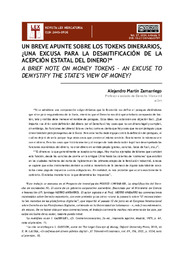Please use this identifier to cite or link to this item:
https://hdl.handle.net/11000/33864Full metadata record
| DC Field | Value | Language |
|---|---|---|
| dc.contributor.author | Martín Zamarriego, Alejandro | - |
| dc.contributor.other | Departamentos de la UMH::Ciencia Jurídica | es_ES |
| dc.date.accessioned | 2024-11-18T08:57:04Z | - |
| dc.date.available | 2024-11-18T08:57:04Z | - |
| dc.date.created | 2024-04 | - |
| dc.identifier.citation | Revista Lex Mercatoria. Vol. 27, 2024 | es_ES |
| dc.identifier.issn | 2445-0936 | - |
| dc.identifier.uri | https://hdl.handle.net/11000/33864 | - |
| dc.description.abstract | Bitcoin surgió con la pretensión de facilitar la creación y la circulación de una suerte de cash o dinero efectivo digital, pero, en términos generales, no ha llegado ser tal cosa, porque —a salvo de ciertas excepciones— no solo no cuentan con el respaldo legal que al dinero en “sentido estricto” se le pre-supone, sino que ni tan siquiera cumple con las funciones económicas esenciales que son propias del “dinero bueno”, en “sentido amplio”, y de sus mejores “sucedáneos”. En cambio, las denominadas stablecoins y las monedas digitales emitidas por un banco central, conocidas en el argot como CBDCs, sí que cumplen estas funciones. Además, las últimas, tienen perfecta cabida en el concepto jurídico estricto de dinero; que, por otra parte, quizá quepa replantearse | es_ES |
| dc.description.abstract | Bitcoin emerged with the aim of facilitating the creation and circulation of a kind of digital cash, but, in general terms, it has not become such a thing, because —with certain exceptions— it not only lacks the legal backing that money in the “strict sense” is supposed to have, but it does not even perform the essential economic functions that are proper to “good money”, in the “broad sense”, and its best “substitutes”. By contrast, the so-called stablecoins and digital currencies issued by a central bank, known in the jargon as CBDCs, do fulfil these functions. The latter, moreover, fit perfectly within the strict legal concept of money, which, incidentally, may need to be reconsidered | es_ES |
| dc.format | application/pdf | es_ES |
| dc.format.extent | 17 | es_ES |
| dc.language.iso | spa | es_ES |
| dc.publisher | Universidad Miguel Hernández | es_ES |
| dc.rights | info:eu-repo/semantics/openAccess | es_ES |
| dc.rights.uri | http://creativecommons.org/licenses/by-nc-nd/4.0/ | * |
| dc.subject | Dinero | es_ES |
| dc.subject | tokens de pago | es_ES |
| dc.subject | bitcoin | es_ES |
| dc.subject | monedas digitales | es_ES |
| dc.subject | Money | es_ES |
| dc.subject | payment tokens | es_ES |
| dc.subject | bitcoin | es_ES |
| dc.subject | digital currencie | es_ES |
| dc.subject.other | CDU::3 - Ciencias sociales::34 - Derecho | es_ES |
| dc.title | Un breve apunte sobre los tokens dinerarios, ¿una excusa para la desmitificación de la acepción estatal del dinero? | es_ES |
| dc.type | info:eu-repo/semantics/article | es_ES |
| dc.relation.publisherversion | https://doi.org/10.21134/wb2d3789 | es_ES |

View/Open:
5.+ALEJANDRO+MARTÍN.pdf
302,57 kB
Adobe PDF
Share:
.png)
